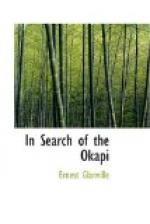“Ohe! Muata grew to strength like the lion’s cub in the knowledge of the hunt. She, even his mother, taught him to follow the trail, showed him the leaf bruised by the foot of a man traveling, showed him the tracks of the beasts, taught him the cries of the animals.
“She rubbed the oil into his skin, set him to hurl the spear, to shaft the arrow, to hit the mark; set him to run and swim, to creep like a snake, to bound like the buck.
“So Muata grew in the ways of a hunter; and when the men of the place went on the hunt, Muata went with them—went as a hunter, and the hut of his mother had meat to spare.
“Then the chief’s wife took the boy to the headmen, and the witch-doctors. They drew on his body the sign of the otter—he who is cunning and brave, who is at home on land or in the water. They made him a warrior, he who was a boy, because there was always meat in the hut of his mother.
“But his mother spoke. ’O Muata, hunter of the wild pig, take your spear and your bow, and the quiver of arrows with the iron heads. You will hunt men.’ Thus it came that Muata went alone on the war-trail. With him went his mother, who carried the pots and the sleeping-mat, she who carried nothing at her kraal.
“The trail led into the Great Forest toward the rising sun, and there were dangers between the sunrise and its setting—dangers between the setting of the sun and its rising.
“A man-ape of great stature, hairy and fierce, stood before us in the path. He lifted his brows at us, and bared his teeth. Muata was afraid, but his mother called to him softly—called to him not to run, called to him to drive this thing from her path.
“Muata notched an arrow and smote the man-ape in the neck. Yoh! He stood like a man upright, and roared. His roar was like the roar of a lion in pain. Foam came from his lips, and his eyes were fierce.
“The knees of Muata shook; his blood was like water. He was afraid, but his mother laughed and cracked her fingers. The man-ape drew near, but she stood—she the chief’s wife. So Muata the boy notched an arrow, and would have loosened it, but she spoke—’Let him come still nearer, O warrior.’
“Muata grew stronger at the word. The man-ape came nearer. Three paces away he stood—and his head was above the head of Muata, his arms were like a young tree, and the chest was like the chest of two men. He opened his mouth and the arrow flew into his throat, bit deep till the point stood out behind. He clutched the shaft with his hands, rocked, and fell, and Muata, taking his spear, thrust it between the great ribs.
“Yoh! the man-ape was dead, and the chief’s wife broke the great teeth from the jaw, and cut off the hairs above the eyes. She burnt them, and mixed them with his blood, for Muata to drink. Muata drank and was strong.
“So those two passed through the forest, through the silent dark of the woods, in pain and hunger. Passed out into the plains where there were kraals and yellow men in white coverings.




